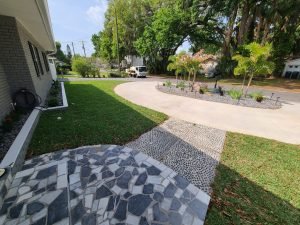Introduction: The Weeds Dilemma
Weeds can be a gardener’s worst enemy, creeping into your beautiful Valrico lawn and taking over before you know it. They’re not just an eyesore; they compete with your grass for nutrients, water, and sunlight. If you're looking for effective strategies to reclaim your lawn from these pesky intruders, you've come to the right place! In this article, we will explore the best techniques for weed management in Valrico, focusing specifically on how to combat weeds effectively in your Valrico lawn.
Whether you’re a seasoned gardener https://squareblogs.net/tinianzeny/valricos-unique-soil-conditions-what-you-should-know or a newbie just starting out, understanding the nature of weeds and how they thrive is essential for successful lawn care in Valrico FL. With expert advice from Tarpon Lawn & Pest, you’ll learn about preventative measures, natural remedies, and advanced techniques for weed control that will help your lawn flourish.
Understanding Weeds: What Are They Really?
What Makes a Plant a Weed?
A weed is any plant that grows where it’s not wanted. But what does that mean? A weed may be a native species that outcompetes desired plants or an invasive species introduced from another region. They often have rapid growth cycles and produce vast quantities of seeds.
The Benefits and Drawbacks of Weeds
While most homeowners view weeds as nuisances, not all are bad. Some can provide benefits such as:
- Soil Improvement: Certain weeds improve soil health by adding nitrogen. Biodiversity: Weeds can attract beneficial insects.
However, the drawbacks typically outweigh these benefits when it comes to lawn care in Valrico FL.
Common Types of Weeds Found in Valrico
Broadleaf Weeds vs. Grassy Weeds
Understanding the types of weeds you're dealing with is key in determining how to combat them effectively in your Valrico lawn.
Broadleaf Weeds
These have wide leaves and include dandelions and clover. They are often easier to control since they do not resemble grass.
Grassy Weeds
These look similar to grass but can cause significant issues if left unchecked, including crabgrass and goosegrass.
Perennial vs. Annual Weeds
Perennial Weeds
These weeds come back year after year unless fully eradicated. Examples include bindweed and quackgrass.
Annual Weeds
Annuals complete their lifecycle in one growing season but can proliferate quickly. Think along the lines of chickweed and foxtail.
How Do Weeds Take Over Your Lawn?
The Role of Soil Quality
Poor soil quality can encourage weed growth by providing ideal conditions for germination and proliferation. Compacted soil or nutrient-deficient areas will be more susceptible to weeds.
Watering Practices That Encourage Growth
Overwatering or irregular watering schedules create an inviting habitat for many weed types.
Sunlight Exposure
Weeds tend to thrive under full sunlight; thus, shaded areas may remain free from them while sunny patches become infested.
Preventative Measures: The Best Defense Against Weeds
Soil Testing: Know Your Ground
Before you tackle weed issues head-on, it’s essential to understand your soil's composition through testing. This can help determine pH levels and nutrient deficiencies that might be encouraging weed growth.
Proper Lawn Maintenance Techniques
Regular mowing at the correct height strengthens grass roots and prevents sunlight from reaching weed seeds.
Mow regularly. Keep mower blades sharp. Avoid cutting too short; maintain at least 3 inches tall.Fertilization: Feeding Your Grass
By using balanced fertilizers specific to your grass type, you promote healthy growth which can overpower invading weeds. Be cautious not to over-fertilize as this could lead to excessive growth that attracts pests!

Mulching: A Natural Barrier
Using mulch around flower beds acts as a deterrent by blocking light from reaching weed seeds while retaining moisture for desirable plants.
Natural Remedies for Weed Control
Vinegar Solutions
Did you know vinegar can kill weeds? Its high acidity makes it an effective herbicide for small infestations:
- Mix vinegar with water. Spray directly onto leaves on sunny days.
Boiling Water
Pouring boiling water directly onto weeds is another effective way without chemicals!
Corn Gluten Meal
This organic herbicide prevents seed germination; applying it requires precise timing—early spring is best!
Chemical Treatments: When Necessary
Understanding Herbicides
Sometimes natural methods aren’t enough! Understanding the different types of herbicides available will equip you with the knowledge needed when those stubborn weeds arise:
Pre-emergent Herbicides
Used before seed germination; they create barriers preventing new weeds from sprouting.
Post-emergent Herbicides
Applied after the appearance of weeds; these target existing plants directly.
Combining Methods for Effective Results
To effectively combat weeds in your Valrico lawn requires a combination approach utilizing both cultural practices (like mowing) alongside chemical treatments if necessary while being careful about timing during application seasons!
Identifying When You Need Professional Help
Sometimes despite our best efforts at home we may find ourselves overwhelmed! Here are signs indicating when it's time call professionals like Tarpon Lawn & Pest:
Persistent infestations despite treatment. Difficulty identifying specific weed types. Concern about environmental impact of DIY solutions!FAQs
What is the best time of year for weed control?
The best time for controlling weeds is typically early spring before they begin sprouting or late fall after they've matured but before winter sets in!
Can I use household items as herbicides?
Absolutely! Items like vinegar or salt work well against smaller infestations without harmful chemicals involved!
How often should I fertilize my lawn?
Generally speaking fertilizing should occur every 6-8 weeks depending on grass type during growing seasons - spring through summer months specifically!
Are there any specific mulching materials recommended?
Organic mulches such as wood chips or straw serve well because they decompose gradually enriching soil plus suppressing unwanted plant life underneath!
Is hand-pulling effective against large infestations?
While hand-pulling works great initially—it isn’t always practical especially if roots remain intact—leading regrowth later down road!
li16/ol3/hr1hr1/##
This article has been designed as an informative guide toward combating pesky intruders while emphasizing sustainable practices whenever possible ensuring healthy vibrant landscapes across beautiful communities nestled throughout Florida—especially right here within stunning surroundings found locally at Valrico!